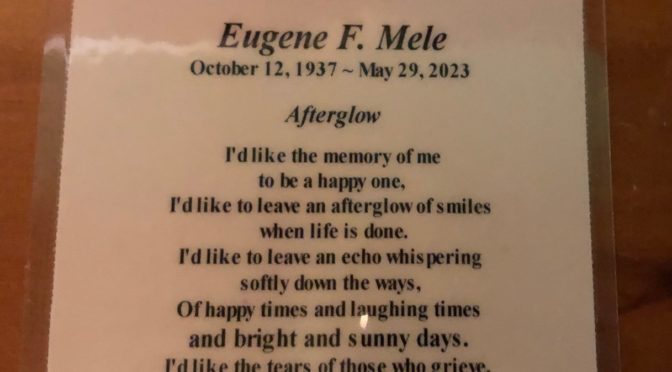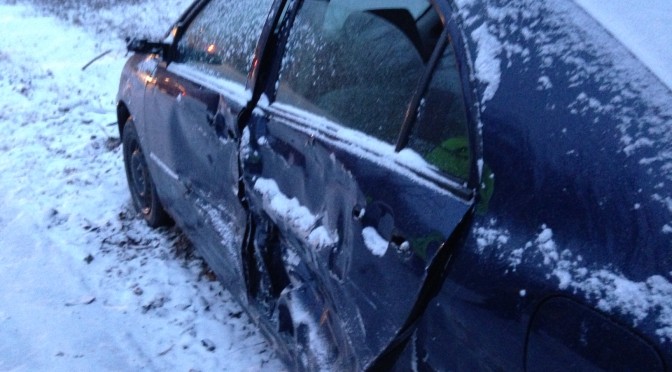For his funeral, Dad had long talked about having a New Orleans jazz band. We don’t have that. Instead, you’re stuck with me.
I’m Christopher Mele. Eugene’s only son, or his “favorite son” as he would often tell me.
On behalf of Eugene’s wife, Winnie, and my sisters Cathy and Lorraine, I want to thank you all for being here this evening, particularly those who have traveled great distances.
Your presence here is deeply appreciated.
I want to point out that there are only three geographic places with “the” in front of their names:
The Vatican, The Hague and the Bronx.
“The” is an important signal of distinction there, especially for the Bronx.
It emphasizes the unique quality of the place.
After all, you don’t hear people referring to “the Brooklyn.”
No, the Bronx is special and special people come from the Bronx.
Such was the case with my Dad.
He was born in the Bronx at Fordham Hospital in 1937.
The road of his childhood was pitted with potholes and detours: His mother had a mental illness and was hospitalized. And my grandfather, who was 14 years older than my grandmother and who had to work, felt ill-equipped to care for an infant, so that meant stays for a time in foster care for Dad.
For more than eight years, he was raised by his sister and her husband, our beloved Aunt Lucille and Uncle Charlie, and for a year, he stayed with his Aunt Henrietta.
But Dad persevered through those childhood traumas and relished the great melting pot in the Bronx where he was raised.
His memories of the neighborhood sound like scripts from a rom-com but they also revealed a particular warmth and a humanity that were his trademarks.
A friend, upon hearing of Dad’s death, wrote to say: “He was as interesting as he was kind, and that’s saying a lot.”
From the old neighborhood, stories from Dad abound.
The father of a friend, a girl named Phyllis, did not approve of the guy she was dating so Dad would pick her up and then when they turned the corner, Dad would hand Phyllis off to her boyfriend. When her date was over, Dad would return her home.
His neighborhood buddies were Dion DiMucci of Dion and the Belmonts, as well as Carlo Mastrangelo, the doo-wop singer who was an original member of The Belmonts.
Dad tells the story of cleaning a butcher shop in the Bronx for $2 a week and a fish store owner recruited him to work there instead.
One day Carl Reiner walked in and Dad, excitedly pointed at Reiner, and said: “You’re Carl Reiner!”
And Reiner in return said: “And you’re the fish boy!”
Dad graduated from high school and a few months later, in 1955, enlisted in the Navy, serving aboard the destroyer, the USS William R. Rush.
A few years ago, I requested his military records and I saw in his application under “leisure activities” that he had listed “fishing.”
As a boy, I had gone fishing with Dad, and I assure you, he was no fisherman.
So, I asked him one day: “Dad, you grew up on Prospect Avenue in the Bronx. Did you fish from a puddle?! Che cazzo è?” (Like WTF in Italian slang.)
He explained that he listed fishing because he thought it would look good and help him get accepted into the Navy.
Dad said that when he was in the Navy that his father went to the Russian embassy to buy Russian war bonds so he would be on the winning side.
He tells the story of his ship being in heavy, heavy seas — the worst of his tour — and he was fearful.
“I got on my knees and prayed to God to keep me safe,” he said. “I swore to Him: ‘I’ll give up smoking. I’ll give up drinking. I won’t see those girls in the bars in Barcelona.’”
“Well, human frailty being what it is, we got through the rough seas and what did I do? I smoked, I drank and I saw those girls in Barcelona!”
When Dad got out of the Navy, he worked at a factory making plastic covers for dry-cleaned clothes and as an electrician for Otis elevators.
But it was working as a maintenance man for Parkchester in the Bronx that changed the trajectory of his life.
It was in that job that he met his future wife of nearly 60 years, Alwine, a German immigrant who worked in a German deli.
The Parkchester maintenance men would come in the morning to get coffees and buttered rolls.
Mom recalls that the first time she was introduced to Dad he touched her face saying, “What a beautiful natural complexion. No makeup.”
I found that strange, she said, but thought: Well, this is America and men behave differently. I really liked his Italian looks, his dark hair and big brown eyes.
Mom, whose English was so-so, was asked by Dad if she liked Viennese music.
She had no idea what he was talking about until he hummed a few bars of the “Blue Danube Waltz” and invited her to a concert.
Mom was suspicious and held him at bay. She said he had that “married look” so Mom did some due diligence and asked around among those in the know.
The verdict from one of Dad’s workmates: “Oh, Mele. He’s a high-class Guinea.”
Everyone around laughed but mom had no idea what it meant and they finally explained that he was an Italian who liked the theater and the opera.
Mom and Dad went to the concert and she wore a beautiful green dress from Germany but did not know they were going to sit on cement steps as the concert was at Lewisohn Stadium on the campus of city college.
She recalls: “Well your father was quite the gentleman. He took out his handkerchief and spread it out for me to sit on. When I saw the big hole in it, I knew he was not married.”
Thus began their courtship that led to their engagement in 1962 and marriage the following year.
In the early going, before Dad got a job with New York Telephone Company, where he’d work for more than 30 years, his employment was spotty.
In one year, he had seven different jobs. He’d hide his toolbox under the bed because he did not want to tell mom he had lost a job.
Even when he had steady work at New York Telephone, he regularly sought to work overtime. I remember as a boy when he would come late at night and kiss me while I was sleeping, his razor stubble rubbing against my cheek.
No one out-hustled my old man for side gigs or finding ways to put bread on the table, whether that meant washing windows or working with furniture makers.
Those efforts led to one of my favorite stories.
He sought work with a Hungarian cabinet maker who had arms as thick as tree trunks, and when Dad said he wanted to work, the cabinet maker, who was drinking with friends, told him:
“Verk?! Ack. No good. Get heart attack and die. Come, have drink!”
Dad said he feared refusing the guy so he had a water glass filled with rye.
Dad said: “I came out of there and I didn’t know if the stars were shining or if it was raining. All I know is it was the best job interview I ever had.”
Dad did not have time for bullies, braggarts, bigots or, to be honest, bosses. He embodied a blue-collar nobility and advocated socialist views: he favored universal health care, a four-day work week and was a supporter of unionized labor.
He was a man of many appetites:
He had a hunger for knowledge, to connect with people and, of course, for food.
He was also a man of many talents: He was a playwright, a student of woodworking and antique restoration, a fan of the arts and museums.
He was also bilingual: He could swear in English AND Italian.
It was when his volcanic temper would erupt that the Italian swearing would flow like a melody.
He could be demanding and a perfectionist, so you didn’t want to be around him when he was agitated.
Dad tells the story that after one of his more memorable blow-ups at the dinner table, I told my sister: “You know Cathy, it’s safer in Vietnam than it is here.” Apparently even when I was younger I was a bit of a smart ass.
Dad was also a ham and a performer. In community theater, he played Marty, Officer Krupke and Big Jule.
And sometimes you never knew what was going to come out of his mouth.
Would it be something profane? A bad joke? Or would it be a bit of wisdom that would start with the phrase, “As they say in Italian…?”
Or would it be something delusional, like when he’d go around introducing himself as his alter ego, the Great Khan, brother of Garbage Khan.
He’d often remind me: “You know if I were not this crazy, your life would be boring.”
But it was his other roles that mattered the most: as husband, father, Opa, brother, uncle and cousin.
My last story of Dad comes when he was 19 years old and in the Navy.
A chief who was an insomniac went out on the deck of an aircraft carrier at 2 in the morning to drink coffee and somehow drifted into the active flight deck.
One of the hooks they use to catch landing planes struck the chief and killed him.
Dad said even though he was not there to witness what happened, it left him badly shaken but another officer told him:
“It was his time to die and you have to accept that.”
Accepting Dad’s death – that’s a hard concept to wrap your brain around because we will miss him so much.
I am sure there will be a point when we will come to accept our loss, but in the meantime, we celebrate his life and we wish him godspeed.



